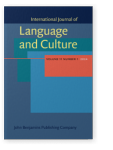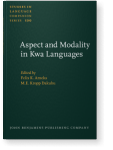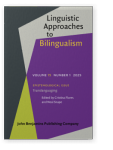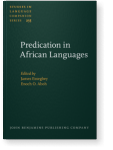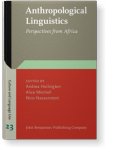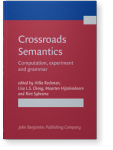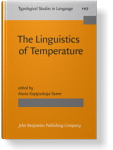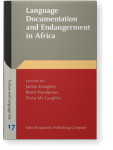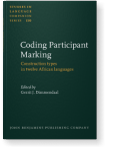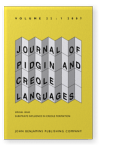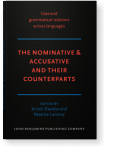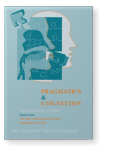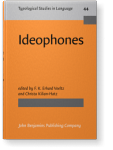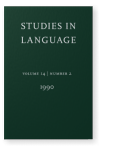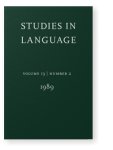Felix K. Ameka
List of John Benjamins publications for which Felix K. Ameka plays a role.
Journal
Title
Aspect and Modality in Kwa Languages
Edited by Felix K. Ameka and Mary Esther Kropp Dakubu
[Studies in Language Companion Series, 100] 2008. ix, 335 pp.
Subjects Semantics | Syntax | Theoretical linguistics
2025 Translanguaging: Rebranding multilingual practices Epistemological issue: Translanguaging, Flores, Cristina and Neal Snape (eds.), pp. 31–35 | Commentary
2024 Chapter 5. Moving from verbs to prepositions in Gbe Predication in African Languages, Essegbey, James and Enoch O. Aboh (eds.), pp. 128–151 | Chapter
Gbe languages have two classes of adpositions, namely prepositions and postpositions that have been argued to have developed from verbs and nouns, respectively. Focusing on the former, we highlight the functions of the forms across Gbe using examples from Eastern Gbe (e.g., Gungbe) and Western… read more
2024 Chapter 6. Conceptions of the make-up of a human person in Ewe Anthropological Linguistics: Perspectives from Africa, Hollington, Andrea, Alice Mitchell and Nico Nassenstein (eds.), pp. 136–176 | Chapter
Humans everywhere construct ethnopsychological models of a person which involves a physical body and non-physical aspects. There is variation in how the non-physical parts of a person are construed. Invariably, it is assumed that this other part is “invisible inside” (Goddard, 2018, p. 168;… read more
2017 Chapter 14. Meaning between algebra and culture: Auto-antonyms in the Ewe verb lexicon Crossroads Semantics: Computation, experiment and grammar, Reckman, Hilke, Lisa Lai-Shen Cheng, Maarten Hijzelendoorn and Rint Sybesma (eds.), pp. 227–248 | Chapter
Abstract
Semanticists continue to debate questions like: are meanings about “things in the world” or “things in the mind”? Are meanings about algebraic calculations or about cultural conceptions? How are multiple senses of a word related? This chapter explores some of these… read more
2015 “Hard sun, hot weather, skin pain”: The cultural semantics of temperature expressions in Ewe and Likpe (West Africa) The Linguistics of Temperature, Koptjevskaja-Tamm, Maria (ed.), pp. 43–72 | Article
Temperature is talked about in different ways across languages. In this paper, I explore the linguistic expressions used to talk about temperature focussing on three domains of experience in two languages in an asymmetric contact relation, Ewe and Likpe, both Kwa (Niger-Congo) languages of West… read more
2015 Unintended consequences of methodological and practical responses to language endangerment in Africa Language Documentation and Endangerment in Africa, Essegbey, James, Brent Henderson and Fiona Mc Laughlin (eds.), pp. 1–15 | Article
The nature and processes of language endangerment in Africa continue to be
debated and contested (see e.g. Luepke 2009). There is however a consensus
among linguists on language documentation as a strategy for safeguarding
Africa’s linguistic diversity. Nevertheless, Africanist linguists are… read more
2009 Likpe Coding Participant Marking: Construction types in twelve African languages, Dimmendaal, Gerrit J. (ed.), pp. 239–279 | Article
This paper explores the ways in which participants involved in the realisation of events as labelled by verbs and licensed by constructions are expressed in Likpe (Sεkpεlé lip), a Na-Togo, Kwa (Niger-Congo) language spoken in Ghana. A semantically based view of grammar is adopted. It is shown that… read more
2008 Aspect and modality in Ewe: A survey Aspect and Modality in Kwa Languages, Ameka, Felix K. and Mary Esther Kropp Dakubu (eds.), pp. 135–194 | Article
2008 Imperfective constructions: Progressive and prospective in Ewe and Dangme Aspect and Modality in Kwa Languages, Ameka, Felix K. and Mary Esther Kropp Dakubu (eds.), pp. 215–289 | Article
2008 Introduction Aspect and Modality in Kwa Languages, Ameka, Felix K. and Mary Esther Kropp Dakubu (eds.), pp. 1–7 | Article
2007 “Cut” and “break” verbs in Gbe and Sranan Substrate Influence in Creole Formation, Migge, Bettina and Norval Smith (eds.), pp. 37–55 | Article
This paper compares “cut” and “break” verbs in four variants of Gbe, namely Anfoe, Anlo, Fon and Ayizo, with those of Sranan. “Cut” verbs are change-of-state verbs that co-lexicalize the type of action that brings about a change, the type of instrument or instrument part, and the manner in which a… read more
2007 Gbe and other West African sources of Suriname creole semantic structures: Implications for creole genesis Substrate Influence in Creole Formation, Migge, Bettina and Norval Smith (eds.), pp. 57–72 | Article
This paper reports on ongoing research on the role of various kinds of potential substrate languages in the development of the semantic structures of Ndyuka (Eastern Suriname Creole). A set of 100 senses of noun, verb, and other lexemes in Ndyuka were compared with senses of corresponding lexemes… read more
2006 Interjections Handbook of Pragmatics: 2006 Installment, Verschueren, Jef and Jan-Ola Östman (eds.), pp. 1–19 | Article
2002 11. Constituent order and grammatical relations in Ewe in typological perspective The Nominative & Accusative and their counterparts, Davidse, Kristin and Béatrice Lamiroy (eds.), pp. 319–352 | Chapter
2002 Cultural scripting of body parts for emotions: On ‘jealousy’ and related emotions in Ewe The Body in Description of Emotion: Cross-linguistic studies, Enfield, N.J. and Anna Wierzbicka (eds.), pp. 27–55 | Article
Different languages present a variety of ways of talking about emotional experience. Very commonly, feelings are described through the use of ‘body image constructions’ in which they are associated with processes in, or states of, specific body parts. The emotions and the body parts that are… read more
2001 Ideophones and the nature of the adjective word class in Ewe Ideophones, Voeltz, F.K. Erhard and Christa Kilian-Hatz (eds.), pp. 25–48 | Article
1994 3 Ewe Semantic and Lexical Universals: Theory and empirical findings, Goddard, Cliff and Anna Wierzbicka (eds.), pp. 57–86 | Chapter
1990 Review of Burchfield (1987): Studies in Lexicography Studies in Language 14:2, pp. 479–489 | Review
